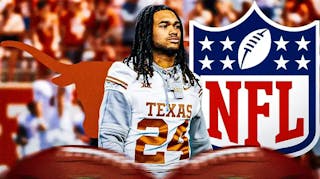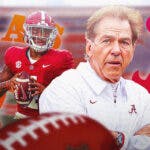There are so many games, so many players on 353 Division I teams that have so many stories that even the most dedicated college basketball fans have to suspend all other activities to keep up during the season. And a player who basically misses two seasons winds up on the missing persons list.
A few weeks ago, as the season was about to start, Andrew Jones was one of those “whatever happened to that guy?” guys. A 6-foot-4 combo guard who was a 5-star recruit in the class of 2017, Jones started 23 of 33 games as a freshman at Texas.
His sophomore season was over after 10 games. In January of 2018, he was diagnosed with acute lymphoblastic leukemia (ALL), the most common type of childhood leukemia. It’s also the most treatable type of childhood leukemia, with a survival rate of around 90 percent.
Still, it’s effing cancer. Leukemia is cancer of the body's blood-forming tissues, including the bone marrow and the lymphatic system. Jones faced a life-changing diagnosis with a stark question: “What if I’m in the 10 percent?”
“That was so shocking. I’d just turned 20, and none of my relatives had ever had cancer,” Andrew Jones said a few months ago.
Just short of two years after being diagnosed, Jones is healthy and is back with the Longhorns. In the season opener, he scored a career-high 20 points. Last Saturday, Jones helped Texas post a 70-66 victory at No. 22 Purdue. Jones ended a late Boilermakers possession with a manly rebound and made all four of his free throws to help UT maintain the lead.
Jones was medically cleared in September. At Big 12 media day in October, Shaka Smart said, “We really believe he's going to be able to help our team. He’s earned the right to be in our rotation.”
There was no reason to doubt Smart. But, still.
A year ago, Jones was undergoing out-patient treatment and dreamed about returning to the sport he loves. The desire to play again helped fuel his desire to rid himself of leukemia. Soon after the diagnosis when he was hospitalized at Houston’s MD Anderson hospital, Andrew found his way to a recreation area where there was an eight-foot-high basket.
— Andrew Jones (@Drewdotcash1) February 7, 2018
Last season, Jones practiced with the team while receiving regular chemotherapy treatments through a PICC line (an installed port for delivery of his medicine). Those regular chemo treatments can be a debilitating cure almost worse than the disease. Jones lost 30 pounds. He played in two games and believed he could last the season before he was convinced to sit out as a redshirt.
“We told him, ‘Man, you’re not ready yet,’” junior guard Matt Coleman said.
**********
Sports are a part of life, bigger for some, smaller than others. The College Sports Industrial Complex, with its billions of dollars in profit and its dramatic product providing programming, creates its share of cynics. Games aren’t enough. The draw and added spice of “compelling stories” help create grist for the mill.
Soft piano music. Tom Rinaldi story telling. Tears. Tissues. “Thanks, Tom. Now let’s go to Ann Arbor, the Big House, for the showdown between Michigan and Ohio State.”
Andrew Jones’ story fits into the “disease fatigue” category. Your Veteran Scribe admits that a compelling headline about an athlete overcoming adversity leads to a quick scan of the story until the nature of the adversity is revealed. Coming back from an ACL has become commonplace. Your story is boring unless cancer is the adversary.
So, let’s add this to the mix.
In April of 2007, Andrew was 7 and along for the ride with big sister Alexis (age 9). Their father David was at the wheel, the coach of his daughter’s AAU team and headed to Midland, Texas for a tournament. A freak ice storm forced Jones to cancel the trip; after a U-turn, he lost control and the car flipped four or five times. Andrew and his sister sustained minor injuries. David Jones was paralyzed from the chest down.
As a grade schooler, Andrew became the man of the house. He helped his mother Carli Seldon by cooking meals and taking care of his father – tasks that included changing his urine bag and helping him from his wheelchair into bed.
Alexis and Andrew each became McDonald’s All-Americans at Irving (Texas) MacArthur High School. Alexis went to Duke, suffered an ACL knee injury and after two seasons transferred to Baylor where she was a two-year starter and first team All-Big 12.
Part of Andrew’s drive was matching his big sister.
“I wanted everybody to know me, and know Andrew Jones not as Alexis Jones’ little brother,” he told the Austin American-Statesman after he signed to play college basketball for the Longhorns. “She was good, and I wanted to get out of her shadow.”
**********
Shadows are funny things. Sometimes they obscure. But they’re created by light. Saturday in West Lafayette, Jones encountered a shadow.
One of last season’s “Rinaldi Stories” involved Tyler Trent, a Purdue student and avid Boilermakers fan who was diagnosed with cancer four times, overcame those diagnoses and finally succumbed about a year ago. The school renamed the gate where students enter the football stadium in his honor.
Mackey Arena is one of the top homecourts in college basketball. The student section is called The Paint Crew and is known more for noise than snark. Opposing players aren’t likely to receive kindness, courtesy and/or empathy.
Gregg Doyel, the outstanding columnist for the Indianapolis Daily Star, was covering the Texas-Purdue game. He wrote about a sign hanging on the wall in front of the student section, a sign that connected the deceased Tyler Trent with a visiting basketball player:
“Andrew Jones
Is Unstoppable
Between those lines was a merger of the Texas and Purdue logos — one-half of a steer’s longhorn, and one half of the iconic Purdue train. The logos were connected by a single orange ribbon, the symbol for leukemia awareness.”
We got you @DrewdotCash.
You’re an inspiration. pic.twitter.com/M7TyrjDpgz
— Purdue Men's Basketball (@BoilerBall) November 9, 2019
Nearly two years ago, Jones’ teammates gathered to hear about their teammate. They thought his sluggish play was the result of the flu. Not leukemia.
“You don’t want to think he’s gonna die, but when you hear leukemia, cancer, that’s what you think,” Coleman said last month. “Death. I didn’t want that thought in my head. I remember the night we heard, it was like the moment was breathless.”
“Unfortunately, that was the worry for anybody,” Smart said last month. “At that point, basketball kinda goes away. You’re not thinking about will he be back playing in a year or two years. You’re just thinking, man I hope he can beat this thing.”
Doyel the columnist can be the print version of Rinaldi because he exposes the raw emotions when he writes. He asked Smart about the sign and the Texas coach had to pause during to keep from crying – after a victory.
“I saw it,” Smart said. “That’s a class act. This is a class place. Literally, it’s saying ‘Andrew Jones is unstoppable’ even though he plays for Texas. It just goes to show …
“This is so much bigger than basketball.”
–
You can listen to and subscribe to the college basketball Cutting The Net Podcast on Apple here or at Soundcloud here.
Also, be sure to follow the College Basketball Facebook page for more great hoops stuff and the ClutchPoints NCAA Facebook page for more great college sports postings. We can also be found on Twitter here.




